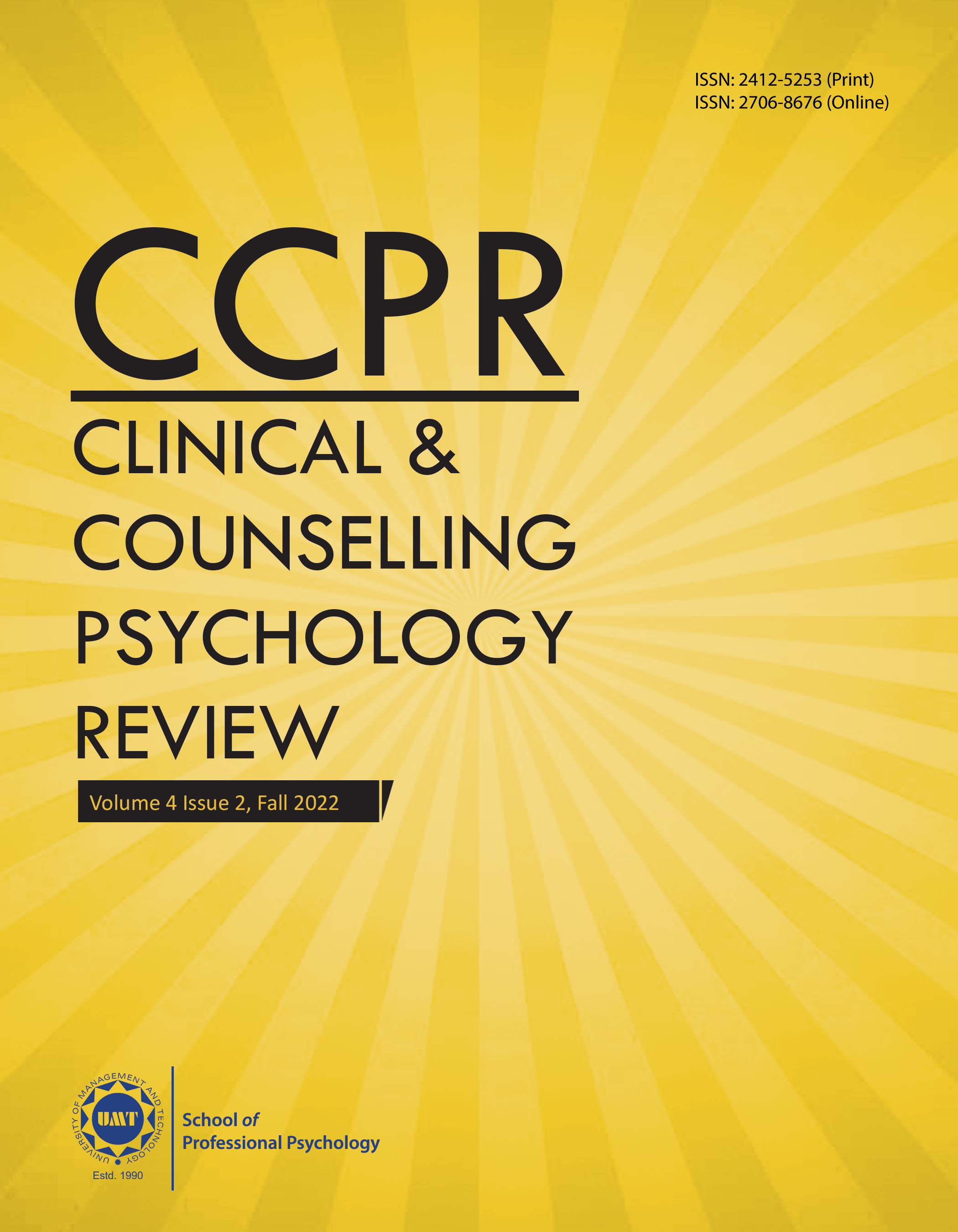Exploring Sufferings in Unmarried Women with Breast Cancer and Surgery
Abstract
 Abstract Views: 77
Abstract Views: 77
The current research was intended to uncover sufferings of unmarried women who had gone through breast surgery or having breast cancer, using Interpretive Phenomenological Analysis (IPA). Purposive sample of 45 women was recruited from Bahawalpur Institute of Nuclear Oncology (BINO), Bahawalpur, Shaukat Khanum Memorial Cancer Hospital, and Institute of Nuclear Medicine & Oncology (INMOL) Hospital, Lahore. Semi-structured interviews were recorded, transcribed and analyzed using IPA. Four core themes were extracted from the experiences of the patients that went through breast cancer diagnosis, surgery and beyond. Themes included undesirable feelings, flattered self, emotional affliction and, dreadful future. Cancer, breast surgery, post-surgical complications and social stigma were main factors that revealed fears in patients.
Downloads
References
Ahmed, F., Mahmud, S., Hatcher, J., & Khan, S. M. (2006). Breast cancer risk factor knowledge among nurses in teaching hospitals of Karachi, Pakistan: a cross-sectional study. BMC nursing, 5(1), 6. DOIhttps://doi.org/10.1186/1472-6955-5-6
Bagheri, M., & Mazaheri, M. (2015). Body image and quality of life in female patients with breast cancer and healthy women. Journal of Midwifery and Reproductive Health, 3(1), 285-292. Doi: http://jmrh.mums.ac.ir/article_3584.html
Banning, M., Hafeez, H., Faisal, S., Hassan, M., & Zafar, A. (2009). The impact of culture and sociological and psychological issues on Muslim patients with breast cancer in Pakistan. Cancer Nursing, 32(4), 317-324. https://doi: 10.1097/NCC.0b013e31819b240f
Crotty, M. (1998). The foundations of social research: Meaning and perspective in the research process. Sage.
Fazzino, T. L., Hunter, R. C., Sporn, N., Christifano, D. N., & Befort, C. A. (2017). Weight fluctuation during adulthood and weight gain since breast cancer diagnosis predict multiple dimensions of body image among rural breast cancer survivors. Psycho‐oncology, 26(3), 392-399.doi:https://doi.org/10.1002/pon.4035
Goffman, I. (1963). Stigma: Notes on the management of spoiled identity. Eaglewood Cliffs, NJ: Prentice-Hall.
Koçan, S., & Gürsoy, A. (2016). Body image of women with breast cancer after mastectomy: a qualitative research. The journal of breast health, 12(4), 145. DOI: 10.5152/tjbh.2016.2913
Kim, M. A., & Yi, J. (2014). Life after cancer: how does public stigma increase psychological distress of childhood cancer survivors?. International journal of nursing studies, 51(12), 1605-1614. https://doi.org/10.1016/j.ijnurstu.2014.04.005
Kralik, M., & Biffis, A. (2001). Catalysis by metal nanoparticles supported on functional organic polymers. Journal of Molecular Catalysis A: Chemical, 177(1), 113-138.https://doi.org/10.1016/S1381-1169(01)00313-2
Link, B. G., & Phelan, J. C. (2001). Conceptualizing stigma. Annual review of Sociology, 27(1), 363-385. https:/doi.org/10.1146/annurev.soc.27.1.363.
Moreira, H., & Canavarro, M. C. (2010). A longitudinal study about the body image and psychosocial adjustment of breast cancer patients during the course of the disease. European journal of oncology nursing, 14(4), 263-270. https://doi.org/10.1016/j.ejon.2010.04.001
Ohaeri, B. M., Ofi, A. B., & Campbell, O. B. (2012). Relationship of knowledge of psychosocial issues about cancer with psychic distress and adjustment among breast cancer clinic attendees in a Nigerian teaching hospital. Psycho‐Oncology, 21(4), 419-426. https://doi.org/10.1002/pon.1914
Perreault, A., & Bourbonnais, F. F. (2005). The experience of suffering as lived by women with breast cancer. International Journal of Palliative Nursing, 11(10), 510-519.https://doi.org/10.12968/ijpn.2005.11.10.19978
Shahzad, A. (2017). In conservative Pakistan, women challenging taboos that are hiding the rise of breast cancer. 2014.
Smith, J.A. (1997) Developing theory from case studies: self-reconstruction and the transition to motherhood, in N. Hayes (ed.) Doing Qualitative Analysis in Psychology.
Smith, J. A., & Shinebourne, P. (2012). Interpretative phenomenological analysis. American Psychological Association.
Tam Ashing, K., Padilla, G., Tejero, J., & Kagawa‐Singer, M. (2003). Understanding the breast cancer experience of Asian American women. Psycho‐Oncology: Journal of the Psychological, Social and Behavioral Dimensions of Cancer, 12(1), 38-58. https://doi.org/10.1002/pon.632
Trusson, D., Pilnick, A., & Roy, S. (2016). A new normal?: Women's experiences of biographical disruption and liminality following treatment for early stage breast cancer. Social Science & Medicine, 151, 121-129. https://doi.org/10.1016/j.socscimed.2016.01.011
Waljee, J. F., Hu, E. S., Ubel, P. A., Smith, D. M., Newman, L. A., & Alderman, A. K. (2008). Effect of esthetic outcome after breast-conserving surgery on psychosocial functioning and quality of life. Journal of Clinical Oncology, 26(20), 3331-3337. doi: 10.1200/JCO.2007.13.1375
Wang, Q. X., Bai, Y., Lu, G. F., & Zhang, C. Y. (2017). Perceived health-related stigma among patients with breast cancer. Chinese Nursing Research, 4(4), 158-161. https://doi.org/10.1016/j.cnre.2017.10.002
Wilson, K., & Luker, K. A. (2006). At home in hospital? Interaction and stigma in people affected by cancer. Social science & medicine, 62(7), 1616-1627.https://doi.org/10.1016/j.socscimed.2005.08.053
William, C., Shiel, Jr. (2018). Medical definition of surgery. Medicinenet.








